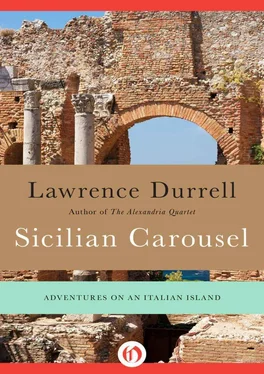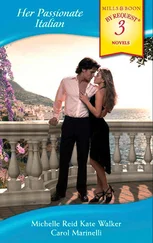“And that would give you a right to call yourself Hadji-Deeds or Hadji-Durrell?”
“Exactly. And you would sport a green turban.” “It would be simpler than buying all this trash.” There was a yellow-eyed man, a gipsy, leaning against a wall and playing monotonously upon a Jew’s harp, its dull twang rising above the chatter and turmoil of the market. His wife was circulating in the crowd touting for fortunes. Mario was oozing his bus through the crowd with the slowness of oil in order to place it square before the entrance. I suddenly realized that it was crazy — to leave Palermo with so much unseen, and with the prospect of a night of carnival to witness. But our itinerary had been fixed by other hands, elsewhere, and with another part of me I felt I ought to stick with my fellow travelers. Anyway it was not for long — the Carousel would come to an end at Messina, whence we would be scattered all over Taormina for the “supplementary free week,” but in different hotels. Nevertheless … “It seems mad not to stay longer,” I said, and Deeds agreed but added, “You can come back in your free week, just rent a little car. This trip is only a spot reconnaissance.” It was the right way to look at it. Superficial as it was I felt that the admiring recognition of the force of the new architecture was really the key to this end of Sicily. I had grasped the language of its later invaders. Moreover, I had bitten off a sufficiently large chunk of the Norman Oriental aesthetic to chew on for the present; a glimpse of Cefalu Cathedral would help, of course, and that was scheduled for the late afternoon. We regained our places and moved slowly off down the long glades towards the capital, whence the roads led outwards again along a grim stretch of coast, towards Cefalu.
The pace had become smarter for we had ambled away a bit too much of our allotted time in the museum; Mario even skipped on to a motorway for a few miles to take in the slack. Then back along a rather grim seacoast, with monotonous outcrops of black cliff covered in sea holly, and black beaches presumably of volcanic ash. Our lunch tables had been set out on a fine shady terrace with a marvelous view but the little beach below was disappointingly rocky and pebbled. Nevertheless a few of our braver members ventured upon a quick dip before lunch over which Roberto presided in an expensive scarlet bathing costume. He was obviously dying to save a life, but nobody gave him the chance. The lunch was banal but the fine setting made it feel almost sumptuous. The Germans held hands in a purposeful way. Beddoes, to everyone’s surprise, took a piece of knitting out of his pocket and started to work his way round the heel of a sock. The dentist’s lady was so amused by this that she offered to darn the hole for him, an offer which he accepted with grace. Roberto, wounded by the signs of German intimacy, played with the cutlery and went hot and cold by turns.
Today despite the superb sunlight one felt a certain heat heaviness which made one think of earthquakes — and what more appropriate since we were heading for Messina. I gathered that normally the Carousel spent the last week together in a Taormina hotel with all excursions optional; but this year there had been trouble with strikes and all European bookings had become problematical. Hence the rather ad hoc arrangements for Taormina where each of us found himself alone in a separate lodging. I was surprised to verify Deeds’s earlier opinion about being sorry to part with my fellow travelers. It was true that I felt a twinge of regret; but I also felt a twinge of relief — for it would have been unthinkable to extend this mode of travel over a longer space of time without coming to dislike, even to hate, it. Had the distances been greater and the stresses more intense we should all now be life enemies instead of friends.
A wind off the sea had got up and on the coast road tugged at our tires like a puppy, making the task of Mario rather more difficult since he wanted to put on a bit of speed. The sea rose. Roberto made a short apologia through the microphone about the wicked way we were just about to treat Cefalu. “You will begin to complain and say it is a scandal to rush into the cathedral and then rush away again. But please try to be charitable. What would you have felt about the Agency if we had cut out Cefalu altogether, saying that there wasn’t enough time, which there isn’t?” It was marvelous the way he found his way among the English tenses; it proved that he always felt called upon to make this statement at this particular place, so that the little speech was well rehearsed. Indeed it was not long before one of the sharper loops of the coast road brought us up on a wooded knoll from which we saw the characteristic profile of Cefalu facing us across a blue bay. I found it astonishingly like the headland of Paleocastrizza in Corfu. It looked like a great whale basking in the blueness — a mythological ruminant of a fish, dreaming of some lost oceanic Eden, its eyes shut. The town clustered close about it. It was very beautiful and Roberto was right really — it was no place to treat with tourist disrespect. But on the other hand, was he right to bring the matter up at all? The Microscopes, for example, would have noticed nothing untoward in our haste, whereas this little speech only tended to make them feel that they ought to ask for their money back. But the Bishop felt the full cultural enormity of the thing for he sunk his chin on his breastbone and gave out the impression of seething like hot milk.
We nosed into this most atmospheric of little towns on a low throttle, for the streets were crowded with holiday-makers in different stages of undress; Mario had by now convinced us that he could put our bus through the eye of a needle if he wished. But Cefalu was quite a trial with its narrow and encumbered medieval streets, and the cathedral lay right at the end of a loop of oneway streets which did not seem to correspond to the traffic realities of the little spa, where ten bicycles might block all the traffic for days, it would seem. But what was good was that the unafraid pedestrian had taken possession of the place and everything conformed to his walking pace. This at once made things harmonious and pleasant — at this speed you could lean out and buy an ice, for the French ladies did, or a clutch of gaudy postcards, for the old Count did, or a charm against the evil eye, for Roberto did. This he handed to Beddoes to preserve him from harm. In a way it sort of accredited us to the townspeople of Cefalu and made us feel at home straight off. But owing to the fool one-way street we had to do that last hundred yards on foot, a pleasant martyrdom for the square in which the church stands is a handsome one.
Once again we had the place more or less to ourselves, and once more Miss Lobb took the opportunity to say a short and comforting prayer to her creator — or was she just praying for the death of Beddoes, as Deeds rather wickedly suggested? Not Miss Lobb, the spirit of London town. Deeds, who knew the place well, elected to spend his time in the lofty porch while the rest of us perambulated the shadowy interior of the building. He was unwilling to snuff out his pipe which was drawing particularly well that day. One of the French ladies had beautiful teeth and was most conscious of the fact, for she showed them frequently in a large smile.
It had become somewhat automatic as a gesture and it was interesting to see her giving this warm alert smile of recognition to inanimate objects, even to the saints in the frescoes. But Roberto was right about Cefalu — the church of Roger II was too important to miss out. It was a wonderful example of the same Norman-Byzantine-Spanish-baroque which had been such a singularly new experience in the island. The building was started in 1131, but took over a century to complete, so that it reflects more than one cycle of historic changes in forms and materials. But William had vowed to have a cathedral built in this place after he nearly suffered shipwreck on the headland. It was the customary way to express gratitude at that epoch, and we have been the ones to benefit from it.
Читать дальше











